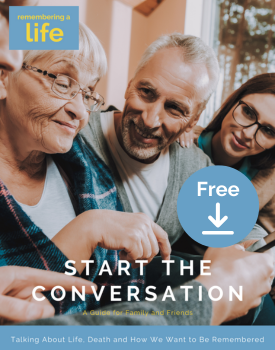If you lost someone you loved today, would you feel like you’ve had as many meaningful conversations as possible with them? Of course, we could never have enough meaningful conversations with the people we love, but so many of us lose loved ones not having any of the conversations they wish they could have.
What if we could change that?
In my work as a grief therapist, many of my clients experience feelings of remorse after the death of a loved one. There are often many things they wish they could ask their person. We sit in session after session talking about the questions they would like to ask, and the conversations they wish they could have.
I always leave these sessions with the same thought – what if we had these conversations before it was too late? Would it change how we grieve? Would it change how we understand and think about the people we love? I believe it would.
When I was 14 years old, both of my parents got cancer at the same time. I was 18 when my mother died and 25 when my father died. As an only child, I was experiencing the loss of my whole little family just as I was entering adulthood. Losing them left me with a lot of big, existential questions. I wanted to know why certain people die when they do, where they go, if we are still connected, and what it is that makes a life meaningful.
Part of what shaped my thoughts around life and death were the two very different ways my parents died. My mother struggled right up until the very end to acknowledge and accept that she was dying. That meant that we didn’t have conversations about it, didn’t say goodbye, and after she was gone, I was left with an enormous amount of guilt and regret.
My father, on the other hand, chose to embrace the end of his life, spending his last days at home, with me and a hospice team caring for him. Because of this approach, my father and I had beautiful conversations, we had the chance to say goodbye, and I was even holding his hand when he died. It was a peaceful death that I know not everyone gets to experience. After he was gone, I felt that I had said everything I wanted to say and that I had the opportunity to ask him the kinds of questions that still lingered for me after my mother’s death. It wasn’t lost on me that this is a rare experience.
Even 25 years later, there are so many things I wish I could go back and ask my mom. I want to know what her teens were like, who her favorite teacher was, her first kiss, her best friend when she was 30, what she imagined for my life, and what she thought happens when we die.
These two different deaths have informed a lot of the work I do today with clients as I help them navigate their own grief processes. Guilt and regret are two of the biggest issues grieving people struggle with.
I know that we often don’t have these conversations because we assume there is time for them down the road. But that isn’t always the case. Or maybe we think we’ve had meaningful conversations, but then after our person is gone, we realize there is so much more we could have asked them. This has been evident more than ever in this last year, as the pandemic has served as a wake-up call, reminding us that we never know what is around the bend.
I think the answer is to start having meaningful conversations with our loved ones when there is plenty of time. Make it a regular practice and a part of our family culture. I’m always looking for new ways to encourage people to be proactive about conversations and end-of-life matters, so when I found out about the Have the Talk of a Lifetime Conversation Cards I was so moved.
The cards are fun, easy and full of questions that prompt incredible conversations, like:
- Describe the most adventurous thing you’ve ever done. Were you scared? How did you feel afterward?
- Describe your greatest accomplishment. What makes it so special to you?
- What has been the happiest moment of your life? The saddest?
- Do you have any regrets or things you wish you’d done differently?
I can only dream of having been able to ask my mom these questions, but I know there are opportunities to still engage with other loved ones in my life, including my own children. I get asked a lot about how to live a more meaningful life. Conversations like this are how.
Learn More on the Podcast
Listen to Claire talk about the role anxiety plays in grief and how we can manage it after loss in an episode of the Remembering A Life podcast:

